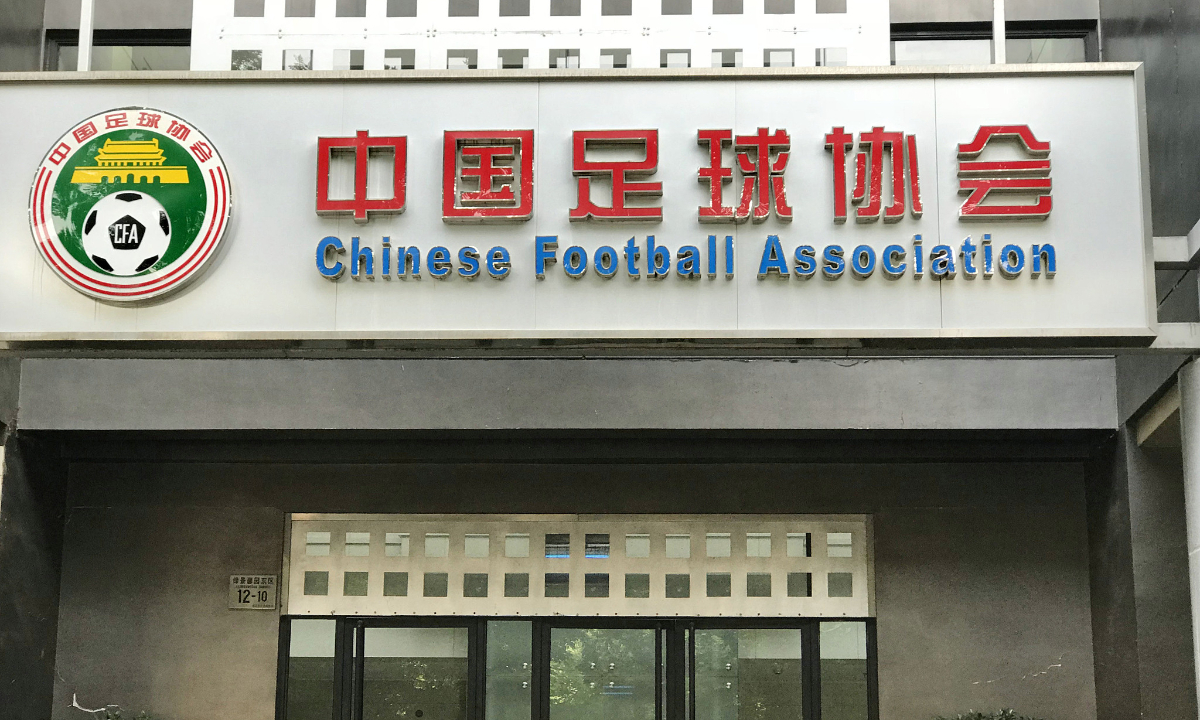Chinese Football Association accelerates restructuring process, reducing divisions from 21 to 16

Chinese Football Association Photo:VCG
The Chinese Football Association (CFA) has accelerated its internal restructuring process after its leadership reshuffle in October. Its latest disclosed restructuring plan has cut the number of divisions within the CFA from 21 to 16. Also, it is highly likely that the future operation of the Chinese third-tier professional soccer league will be unified under a professional league company.
According to Beijing Youth Daily, the new CFA will integrate its internal structure according to the model of "13 departments + 2 companies + 1 base." Departments such as the venue department and strategic planning department will be abolished, and their original functions will be transferred to other departments. The restructuring plan has already obtained approval from the higher-level department.
Previously, the CFA had an organizational structure of "18 + 1 + 1 + 1." The CFA had 18 functional departments, in addition to a wholly-owned subsidiary, a national team training base, and the Chinese Super League (CSL) company.
According to the latest plan, the future CFA will have 13 functional departments: Party Affairs, Discipline Inspection and Supervision, Media and Public Relations, General Affairs, Foreign Affairs, National Team Management, Youth Training, Women's Football, Refereeing, Competition, Technology, Social Football, and the Members Association.
Since 2020, the CFA has strengthened its efforts to streamline its internal structure because in the previous two years, it had established as many as 28 departments, which placed a heavy burden on the association's operations.
According to media reports, since the 1990s when Chinese soccer entered the professionalization track, each new CFA leadership team has consciously made adjustments to the organizational structure. However, the changes in internal organizational structure have likely led to confusion in soccer management. For example, in 2010, the CFA made the decision to abolish the Women's Department, but after the poor performance of the Chinese women's soccer team in 2011, where they failed to qualify for the London Olympics, the CFA reinstated the department.
In addition, the future operation of the CSL, China League One (CL1), and China League Two (CL2), the three tiers of professional soccer leagues will likely be carried out by a newly established company for professional leagues.
"Many times now, the CFA and its new leadership have introduced positive new policies or frameworks. However, often due to various reasons, these new policies are implemented unstably," Wang Dazhao, a Beijing-based sports commentator, told the Global Times on Wednesday, pointing out that whether this reform can make positive progress will depend on the implementation.
He said that the development of Chinese soccer may need a period of palliative treatment to allow the soccer industry to develop naturally.
In 2023, the soccer industry in China has been experiencing an anti-corruption storm. At least 13 CFA officials, including the former chairman of the CFA, Chen Xuyuan, have been placed under investigation since November 2022, when an investigation into former head coach of the Chinese men's national soccer team Li Tie was initiated.
Liu Jun, former chairman of the CSL Company, was put under investigation in August. So far, all six former chairmen of the CSL Company since its establishment in 2006 have been investigated.
As China's soccer industry faces an anti-graft crackdown, sports authorities have held several meetings to reflect on the problems that have emerged across the industry. In October, former Liaoning sports official Song Kai was elected as president of the CFA at the organization's membership national conference. Soccer fans have pinned their hopes on Song to revitalize Chinese soccer.



